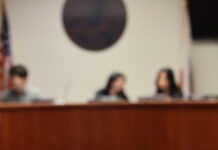
“I think the problem with the resolution is that it doesn’t differentiate between the act of vandalism and its content…the Israeli Flag represents the nation-state, not the people,” stated fourth-year Shaheen Nassar, who argued that act amounted to political criticism against the Israeli government and was not a hate crime aimed at Israelis. However, Nassar condemned the physical act itself as “reprehensible” and supported a public denunciation of the act without the use of the contested phrase. Senators Derek Roberts and David Falstein were among the supporters of the resolution in its current form which stated, “The University of California does not condone any sort of hate crime.”
“By defacing an Israel flag at an institution…in front of their own place of gathering would be considered a hate crime…whether it was meant to be hate or political, the fact is… [that] it came off to be a hate crime,” argued Roberts, who authored the resolution.
The connection between the definition of a hate crime and how it related back to the resolution itself prompted a debate amongst senators and members of the audience. Nassar linked the definition of racism to having “institutional value,” sourcing the classification back to UC Riverside Ethnic Studies Chair Dylan Rodriguez. Through this interpretation, Nassar argued that the racial stereotype of term “terrorist” is not typically associated with Jewish communities.
Senator Esther Hwang supported the altering of the resolution in order to provide clarity, while others expressed the desire for more emphasis on the act of defacement, lest the standards be lessened in terms of defining a hate crime. “Our intention is to condemn any further action such as this from happening again and that there are better ways of going about expressing political ideologies than defacing property,” stated Senator Roberts. As a result of the differences in opinion, the resolution was tabled and will likely arise in a new form during the next ASUCR meeting.
Senator Hwang and Albert Yum’s involvement in the “Leg Con” controversy was also revisited during the meeting. At the previous ASUCR meeting, Senator and Vice President of External Affairs Andrew Whall announced that none of the Leg Con attendees would be charged a $500 fee for failing to carry out the full extent of their duties. Whall defended his decision, noting that the contract specifications for senators’ requirements was “up for interpretation.”
Other items addressed during the public forum period addressed a students’ request for increased number of seats allocated to each respective college, the implementation of more hydration stations throughout campus and the need to register more students to vote. UC Riverside alumna Latonya Young also pressed senators to endorse May 30–which coincides with the senior barbecue–as a day of diversity for students to dress in cultural attire.
The next ASUCR senate meeting will take place on May 30 (5 p.m.) in HUB 221.








